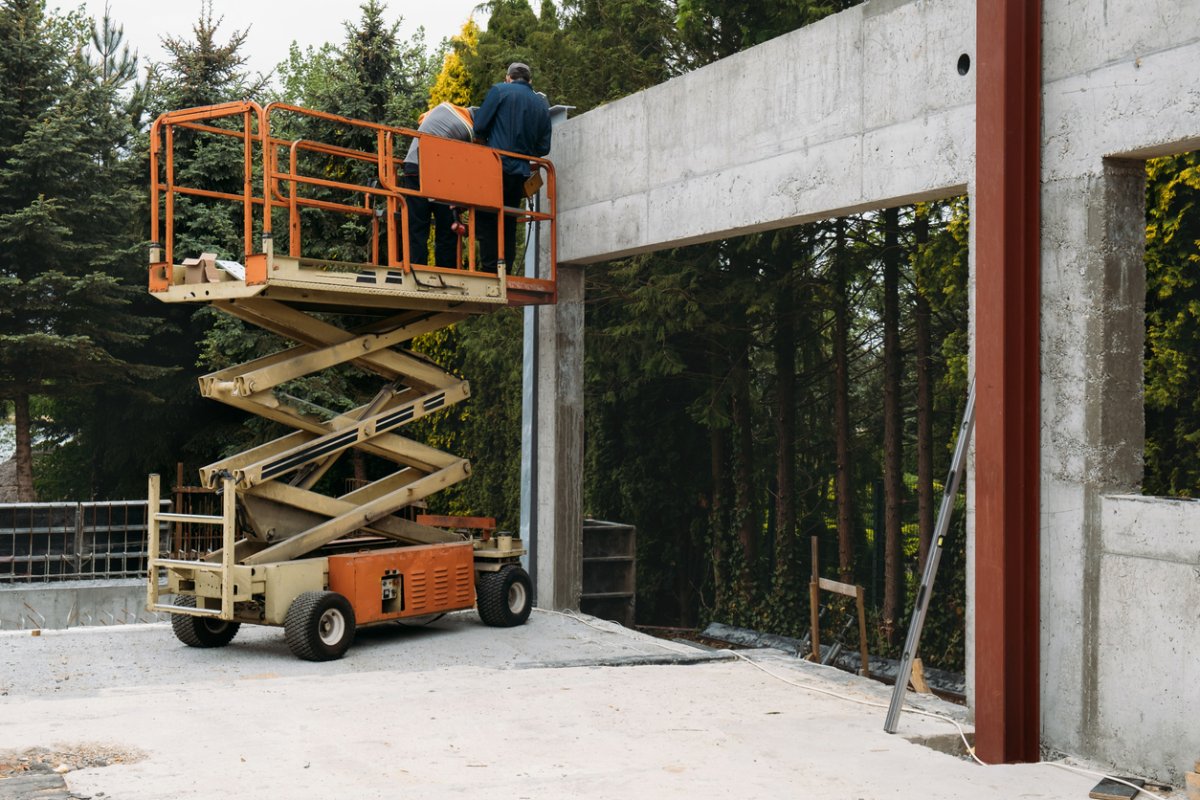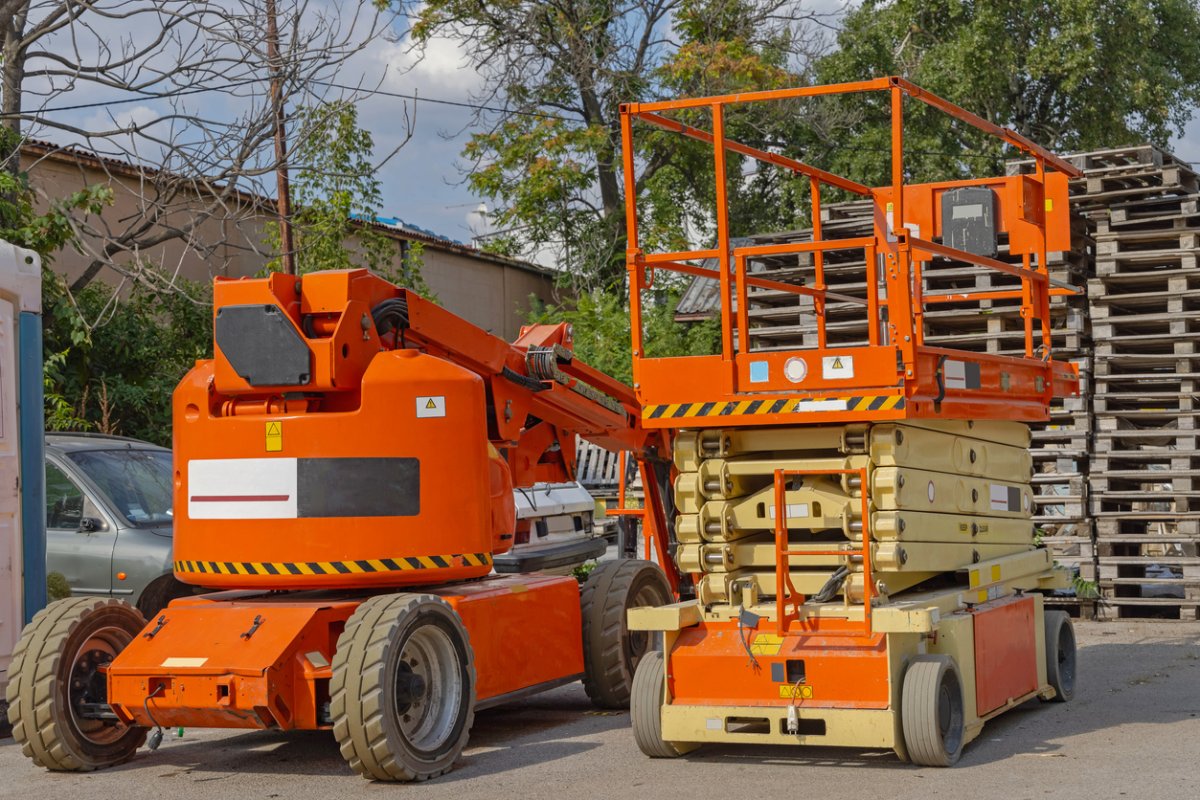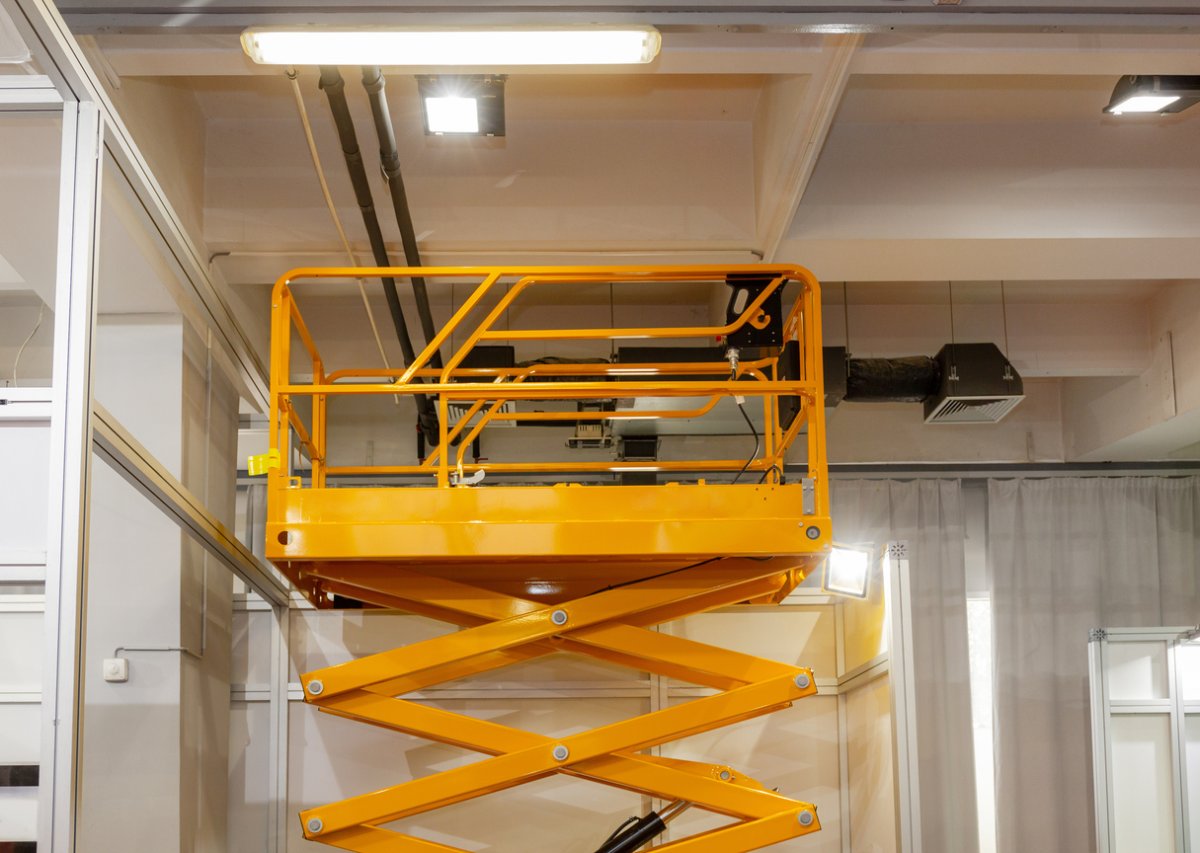We may earn revenue from the products available on this page and participate in affiliate programs. Learn More ›
Highlights
- It typically costs between $175 and $1,027 per day to rent a scissor lift.
- The main factors that affect the cost of renting a scissor lift include the rental company used, the duration of the rental, the type and height of the scissor lift, the geographic location of the rental store, and rental fees and taxes.
- There are several benefits of renting a scissor lift, including cost savings, a variety of choices of equipment size and height, access to high-end machines, and no maintenance costs.
Want to rent a scissor lift? See your options at The Home Depot.
Scissor lifts are mobile platforms specifically designed to elevate workers and materials to various heights. Commonly found in construction and maintenance, these self-propelled machines offer the advantage of being driven around the worksite for easy positioning. The namesake scissor-like lifting design features crossed metal supports that raise and lower a platform to provide a stable work area for one or more people. Renting a scissor lift is a cost-effective solution for short-term projects compared to the cost of buying one.
The cost of scissor lift rentals can vary depending on a few important factors. The major influence is the type of scissor lift needed for the job. Scissor lifts come in various sizes, with electric models being the most budget-friendly option. Rental duration is another factor that affects the price. Daily rates are generally higher than rentals by the week or month. Renters can expect to pay anywhere from $175 to $1,027 per day for scissor lift rental cost when renting from one of the best tool rental services. Customers will want to keep in mind that additional costs like delivery fees, insurance, and operator certifications might also apply to the cost to rent a lift.

Key Cost Factors
The rental company’s pricing structure, rental duration, scissor lift type, and lift height are some of the most important aspects that influence the cost of a scissor lift rental. Geographic location also plays a role, with varying rates depending on the region. Additional fees such as delivery, setup, insurance, and taxes can significantly affect the total cost. Local rental averages can differ because of demand, competition, and regional pricing. Understanding how rental prices can change will help customers budget for the cost to rent a scissor lift and avoid any unexpected charges.
Want to rent a scissor lift? See your options at The Home Depot.
Rental Company
The rental company a customer chooses can affect scissor lift rental costs in a few ways. Each company has its own way of calculating rental prices. Some offer flat daily rates, while others might have tiered pricing based on rental duration or have hidden fees rolled into the base price. Shopping around and comparing prices from at least three different rental companies can help customers find the best deal.
The specific scissor lift needed for the job might not be available at every rental company. If a company has a limited selection or a high demand for a particular lift, the charges might be higher.
Rental Duration
The longer the rental duration, the more expensive the overall price to rent a scissor lift. Understanding how rental duration affects the price can help customers plan for their project.
Rental companies typically offer scissor lifts at a higher daily rate than weekly or monthly rentals. This is because they can expect more consistent business by offering longer rental periods. For renters who know they’ll need a rental scissor lift for an extended period, deciding on a weekly or monthly rental can significantly reduce the overall cost per day.
While daily rates might seem convenient for short-term projects, they can add up quickly. Locking in a longer rental period provides a more predictable cost in the long run. If the project timeline is uncertain, a daily rate might provide some flexibility in case the job is finished earlier than expected.
Scissor Lift Type and Height
Choosing the right scissor lift for the job is essential, so customers will want to make sure they have a full understanding of the different types available. There are five types of scissor lifts, each with its individual strengths: diesel, electric, hydraulic, pneumatic, and rough terrain. By knowing the advantages of each, renters can make sure they pick the best lift for their project.
- Diesel scissor lifts. Diesel scissor lifts are a popular choice for construction sites thanks to their size and strength. They work well for outdoor projects and can extend upward from 20 to 50 feet. The larger size of the lift means a larger platform, offering a good amount of space for multiple people. Some of the downsides of diesel scissor lifts are the fumes and the noise, which make them unsuitable for indoor projects.
- Electric scissor lifts. Electric scissor lifts offer a clean and quiet alternative to their diesel counterparts. Since they don’t rely on fuel combustion, they operate silently and produce zero emissions. This makes them ideal for indoor areas where ventilation might be limited and fumes from diesel lifts pose a safety risk. While electric models might lack the power and reach of diesel lifts, their compact size is a major advantage. They can navigate tight spaces that bulkier lifts wouldn’t be able to access. Electric scissor lift rental cost is typically cheaper than diesel-powered options.
- Hydraulic scissor lifts. Hydraulic scissor lifts, powered by either manual hand pumps or engines, use pressurized hydraulic oil to raise and lower their platforms. This straightforward design makes them user-friendly, requiring minimal user training. It’s important for renters to keep in mind that cold temperatures can affect hydraulic scissor lifts. As the oil thickens in colder weather, older models may have reduced speed and power. Many newer models don’t have this issue, but it’s something to think about when renters are working in colder temperatures.
- Pneumatic scissor lifts. Unlike their fuel-powered counterparts, pneumatic scissor lifts are powered by compressed air. They essentially work like a vacuum, drawing in regular air and then compressing it to elevate the platform. This air-powered system is emission-free, making it an excellent choice for indoor projects. Just as with electric lifts, they don’t have the same power as diesel scissor lifts.
- Rough-terrain scissor lifts. Standard scissor lifts can struggle on uneven surfaces, but rough-terrain scissor lifts are designed to handle difficult worksites. They have heavy-duty tires, increased weight capacity, and enhanced safety features like fall arrestors that keep workers safe. Rough-terrain lifts are built to handle bad weather, keeping people secure at elevated heights during rain or windy conditions. They typically run on liquid propane, gas, diesel, or even a combination of fuels.
Generally, taller scissor lifts can handle additional weight and have more wind resistance at greater heights. Rental companies usually charge more for these lifts.
Geographic Location
Geographic location can influence lift equipment rental costs in a few important ways. First, areas that experience a high rate of construction or don’t have many scissor lift rental companies can have more expensive rental rates. Locations that have lower demand or more rental companies might have more competitive pricing.
The overall cost of living also varies by region. In areas with a higher cost of living for items like labor, fuel, and maintenance, scissor lifts for rent can be more expensive than in other areas. Finally, delivery fees also factor into the total rental cost. If a customer is located far away from the rental company, they will most likely pay more for delivery than someone closer.
Fees and Taxes
The distance from the rental company and any special delivery requirements affect the average scissor lift rental cost. Local and state taxes will also be added to the final bill, and if a renter’s insurance doesn’t cover the lift, they may need to add a rental protection plan to cover accidental damage.

Scissor Lift Rental Companies
It’s always recommended for homeowners to compare quotes from multiple companies to find the best deal when looking for a scissor lift for rent. Home improvement stores like Lowe’s and The Home Depot often cater to DIYers and smaller projects, so they might have limited lift options, while national rental chains like Herc Rentals, Sunbelt Rentals, and United Rentals typically have a wider selection of lifts, including specialized models.
Want to rent a scissor lift? See your options at The Home Depot.
Editor’s note: Costs were calculated using ZIP code 45458 and were accurate at the time of publishing. Costs will vary depending on location and other factors.
| Rental Company | Rental Cost (4 Hours) | Rental Cost (Per Day) | Rental Cost (Per Week) | Rental Cost (4 Weeks) |
| Herc Rentals | N/A | $175 to $420 | $355 to $935 | $700 to $2,200 |
| Lowe’s | $219 to $279 | $219 to $279 | $657 to $837 | $1,643 to $2,093 |
| Sunbelt Rentals | N/A | $180 to $585 | $380 to $1,210 | $580 to $2,455 |
| The Home Depot | $199 to $419 | $199 to $419 | $398 to $1,048 | $597 to $2,243 |
| United Rentals | N/A | $123 to $1,027 | $245 to $2,053 | $504 to $5,175 |
Herc Rentals
Known for its extensive fleet and nationwide presence, Herc Rentals offers competitive rates with a range that typically falls within the national average. The company offers a variety of scissor lifts that include compact, electric, and rough-terrain lifts. Available compact lifts range in height from 13 to 16 feet, the electric options run from 14 to 45 feet, while rough-terrain lifts range from 26 to 53 feet. On average, Herc Rentals charges $175 to $420 per day, $355 to $935 per week, and $700 to $2,200 per month to rent an electric scissor lift.
Lowe’s
Lowe’s offers only a few scissor lifts for rent, including electric models that have a height of 19 feet and 26 feet. A small scissor lift can fit through a standard-size doorway and work well for electrical maintenance, painting, lighting, and HVAC jobs. Lowe’s rental rates run from $219 to $279 for 4 hours, $219 to $279 per day, $657 to $837 per week, and $1,643 to $2,093 for a monthly rental.
Sunbelt Rentals
Sunbelt Rentals offers a variety of electric scissor lifts that range in height from 10 feet to 44 feet, with narrow and wide platforms available. While some options can fit through standard-size doorways and work best for indoor jobs, others are suitable for outdoor work. The average rental rates at Sunbelt Rentals are $180 to $585 per day, $380 to $1,210 per week, and $580 to $2,455 per month.
The Home Depot
The Home Depot has electric, rough-terrain, and additional electric lifts that come with a trailer to safely tow the machine to a job site. The electric lifts have heights that range from 19 to 40 feet, the rough terrain options extend from 32 to 40 feet, while the electric lifts with a trailer are available in 19- and 26-foot options. The Home Depot offers scissor lift rental prices at $199 to $419 for 4 hours, $199 to $419 per day, $398 to $1,048 per week, and $597 to $2,243 per month.
United Rentals
United Rentals has an extensive selection of scissor lifts for rent, including zero-emission electric options and heavy-duty rough-terrain machines that work on uneven terrain and mud. The available lightweight lifts range in height from 10 to 40 feet, while the rough-terrain lifts can extend from 25 to 70 feet. United Rentals charges from $123 to $1,027 per day, $245 to $2,053 per week, and $504 to $5,175 per month to rent various scissor lifts.

Benefits of Renting Over Buying
Scissor lift rentals can be a smart solution for many types of jobs, offering advantages over purchasing a lift outright.
Want to rent a scissor lift? See your options at The Home Depot.
Cost Savings
Renting a scissor lift saves customers from a big up-front purchase. This is especially beneficial for onetime jobs or situations where the lift isn’t needed all the time. By avoiding the cost of buying and maintaining the equipment, renters can put that money toward other parts of the project.
Variety of Choices
Rental companies typically have a wide range of scissor lifts, from different sizes and heights to specialized features. This variety ensures that renters can find the exact lift they need for their project and can get the most out of their rental.
Access to High-End Machines
Equipment rental companies often stock the newest scissor lifts that have advanced features. This allows renters to use top-of-the-line equipment on their project and have access to high-end machines that can keep them safe while working on their project.
No Maintenance Costs
Rental agreements typically cover routine maintenance and repairs by the rental company. This saves the renter the money and hassle of upkeep, and it makes sure the scissor lift is always in top condition.

How to Save Money
For those who need a scissor lift for a project but are concerned about the cost, there are several ways to save money on renting one.
- Shop around and compare quotes. Customers will want to get quotes from multiple rental companies, including national chains, local rental yards, and equipment suppliers. Prices can vary significantly, so comparing options can lead to significant savings.
- Plan the rental duration. Scissor lift rentals are usually cheaper per day for longer rental periods. If the project timeline allows, customers may want to consider a weekly or even monthly rental to bring down the daily cost.
- Choose the right lift for the job. Customers will want to look into the best scissor lift for the job and avoid paying for features that aren’t needed. Electric scissor lifts might work well for indoor jobs, while rough-terrain models are the best choice for uneven surfaces. Choosing the best lift for the project requirements helps renters avoid paying extra for features they don’t need.
- Ask about off-peak rates, and plan ahead. By scheduling rentals in advance, customers can take advantage of lower rates. Rental companies may offer discounted rates for rentals during weekdays or off-peak hours.
Questions to Ask
Asking the right questions up front can help save time, money, and potential headaches. Here are some questions to ask about a scissor lift rental.
- What types and sizes of scissor lifts do you have?
- What is the weight capacity of the lift?
- Is there a minimum or maximum rental period?
- Do your rental rates include delivery and pickup, or are those extra fees?
- What safety features do your scissor lifts have?
- Do I need an operator certification to use the lift?
- Can you walk me through the proper operation of the scissor lift?
- What safety measures should I take while using the lift?
- Who should I contact in case of any malfunctions or breakdowns?
- What is the return process for the scissor lift?
- Are there any additional fees for late returns or cleaning?
- How do I file a damage report if needed?
- How can I leave a review of your services?
FAQs
Scissor lifts offer a safe and efficient way to access elevated work areas. Renting a scissor lift can be a cost-effective solution for short-term projects, but it’s important for customers to consider all aspects before securing a rental. Here are some frequently asked questions about scissor lifts to help renters make an informed decision.
Scissor lifts have limitations compared to other aerial lifts. The restricted reach makes them unsuitable for jobs that need workers to move from side to side. They can also be relatively slow compared to boom lifts when it comes to repositioning. Scissor lifts might not be ideal for uneven surfaces unless a rough-terrain model is rented.
The lifespan of a scissor lift depends on the level of maintenance, frequency of use, and overall working conditions. With proper care and maintenance, electric scissor lifts can last around 30 years.
Scissor lifts are safe when used properly and according to the manufacturer’s guidelines. They come with various safety features like guardrails, overload protection systems, and emergency stop buttons. To ensure maximum safety, operators should always have proper training before using a scissor lift. When safety guidelines are followed and the equipment is used for its proper purposes, a scissor lift can be a valuable and safe tool for many different types of jobs.
Cat Rental Store, Herc Rentals, Lowe’s, Sunbelt Rentals, The Home Depot, United Rentals, Above All Equipment


